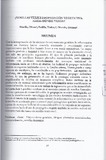¿Semillas versus propagación vegetativa: hacia dónde vamos?

View/
Date
2023-06-23Palabras Clave
Mejoramiento genético, bloques plantados monoclonales, comercialización, semillas forestalesGenetic improvement, planted monoclonal blocks, commercialization, forest seeds
Metadata
Show full item recordAbstract
Con la incorporación de las técnicas de mejoramiento genético, la reforestación clonal en América Latina continúa avanzando y encontrando nuevas organizaciones que la han logrado llevar a una escala operacional. La mayor ganancia genética y facilidad o bajo costo de manejo de la plantación clonal, han sido sus principales argumentos. El tipo de plántula producida y la posibilidad de establecer bloques plantados monoclonales, están causando también una profunda transformación del concepto tradicional de reforestación hacia un cultivo de madera. La facilidad de propagar individuos adultos en especies latifoliadas como la Gmelina arborea, Tectona grandis y varias especies de eucaliptos, ha contribuido a su popularización. En especies de coníferas, sin embargo, no se ha logrado fácilmente propagar individuos adultos, lo que ha promovido el uso de la estrategia conocida como la amplificación de familias de hermanos completos. Estos cambios en la producción de material seleccionado para reforestación están modificando su comercialización. Se revisa en este trabajo la experiencia que se ha desarrollado en Costa Rica y posibles cambios en el mercado interno de semillas forestales. Nuevas opciones de comercialización de propágulos se están investigando, así como la transformación tecnológica de los viveros forestales tradicionales. Se discute el futuro de la semilla como material de reforestación y se concluye que la semilla irá perdiendo poco a poco el papel protagónico que tuvo hasta ahora, a pesar de su mayor facilidad de comercialización en la mayoría de las especies. Los cambios hacia el uso de propágulos exigirán también un cambio radical del concepto y papel del banco de semillas tradicional
Información Adicional
| Otros Títulos | Seeds versus vegetative propagation:where are we going? |
| Correo Electrónico | ifla@ula.ve |
| ISSN | 0798-2437 |
| Resumen en otro Idioma | With the incorporation of techniques of genetic improvement, clone reforestation in Latin America continues to have advances and find new organizations that have archieved it to carry out to an operational scale. The highest genetic gain and facility or low cost of clone plantation management have been their main arguments. The type of seedling produced and the possibility to establish planted monoclone blocks are also bringing about a deep transformation of the traditional concept of reforestation toward a wood crop. The facility of spreading mature individuals in broadleaf species as Gmelina arborea, Tectona grandis and several species of eucalyptus, has contributed to their popularization. In species of coniferous, however, it has not been possible to spread mature individuals, what has promoted the use of a well-known strategy as broadening of complete siblings families. These changes in the production of selected material for reforestation are modifying their commercialization. In this work, experience that has been developed in Costa Rica and possible changes in the domestic market of forest seeds is reviewed. New options of propagules commercialization are investigating, as well as technological transformation of the traditional forest nurseries. It is discussed the future of the seed as reforestation material and it oncluded that seed will go losing a starring role that had up to now, step by step in spite of its higher commercialization facility in most of the species. The changes toward the use of propagules will also demand a radical change of the concept and role of traditional bank of seeds |
| Colación | 67-77 |
| Periodicidad | Semestral |
| Página Web | http://www.saber.ula.ve/forestalatinoamericana/ |
| País | Venezuela |
| Institución | Universidad de Los Andes |
| Sección | Revista Forestal Latinoamericana: |





